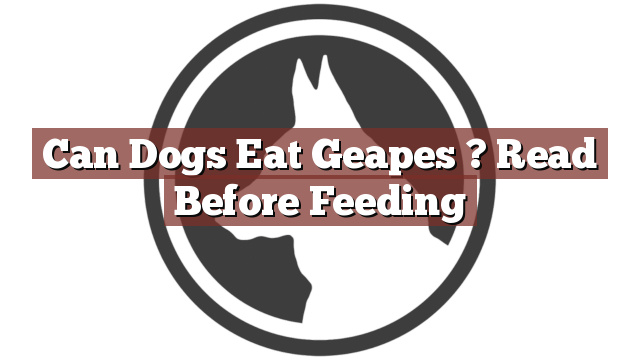Understanding Your Dog’s Dietary Needs
As a responsible dog owner, it is crucial to understand your dog’s dietary needs to ensure their overall health and well-being. Dogs have specific nutritional requirements that differ from humans. While some human foods can be safe for dogs, others can be harmful or even toxic. Therefore, it is important to always research and be cautious before introducing any new food into your dog’s diet.
Can Dogs Eat Grapes? Read Before Feeding
Can dogs eat grapes? This is a common question among dog owners, and the answer is a resounding no. Grapes, along with raisins, have been found to be toxic to dogs. The exact substance within grapes that causes the toxicity is yet to be identified, but it is thought to affect the kidneys and can potentially lead to kidney failure. It is crucial to understand that even a small amount of grapes can be harmful to your dog, and the effects can be severe.
If you suspect that your dog has ingested grapes or raisins, it is essential to seek immediate veterinary assistance. Symptoms of grape toxicity may include vomiting, diarrhea, weakness, and increased thirst. Prompt medical attention can help prevent any potential complications and give your dog the best chance at recovery.
Pros and Cons of Feeding Grapes to Your Dog
When considering the pros and cons of feeding grapes to your dog, the cons far outweigh any potential benefits. While grapes are a delicious and nutritious snack for humans, they pose a significant risk to our canine companions. The potential harm to their kidneys and the lack of a known safe dosage makes it best to avoid feeding grapes to your dog altogether.
On the other hand, some may argue that grapes provide certain health benefits due to their antioxidants and vitamins. However, there are numerous other fruits and vegetables that are safe and healthier options for dogs, such as apples, blueberries, and carrots. It is always recommended to consult with your veterinarian about suitable treats and foods that can be incorporated into your dog’s diet to ensure their well-being.
Conclusion: Exercise Caution and Consult a Vet Before Feeding Grapes to Your Dog
In conclusion, it is crucial to exercise caution when it comes to feeding grapes to your dog. The potential risk of kidney damage and toxicity outweigh any potential benefits. While some dogs may consume grapes without showing any immediate symptoms, it is important to remember that the effects can be delayed and severe. As a responsible pet owner, it is always best to err on the side of caution and avoid feeding grapes or raisins to your dog entirely.
If you have any concerns or questions regarding your dog’s diet, it is highly recommended to consult with your veterinarian. They can provide you with the most accurate and up-to-date information regarding safe and healthy food choices for your beloved furry friend. Your veterinarian will consider your dog’s individual needs, age, and any existing medical conditions, helping you make informed decisions about their diet and overall well-being.
Thank you for taking the time to read through our exploration of [page_title]. As every dog lover knows, our furry friends have unique dietary needs and responses, often varying from one canine to another. This is why it's paramount to approach any changes in their diet with caution and knowledge.
Before introducing any new treats or making alterations to your dog's diet based on our insights, it's crucial to consult with a veterinarian about [page_title]. Their expertise ensures that the choices you make are well-suited to your particular pet's health and well-being.
Even seemingly harmless foods can sometimes lead to allergic reactions or digestive issues, which is why monitoring your dog after introducing any new food item is essential.
The content provided here on [page_title] is crafted with care, thorough research, and a genuine love for dogs. Nevertheless, it serves as a general guideline and should not be considered a substitute for professional veterinary advice.
Always prioritize the expert insights of your veterinarian, and remember that the health and happiness of your furry companion come first.
May your journey with your pet continue to be filled with joy, love, and safe culinary adventures. Happy reading, and even happier snacking for your canine friend!

